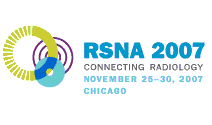
Abstract Archives of the RSNA, 2007
LL-NR4059-L03
Hypoglycemic Encephalopathy: Prognosis Prediction by MR Findings
Scientific Posters
Presented on November 28, 2007
Presented as part of LL-NR-L: Neuroradiology/Head and Neck
Youngjoo Kim, Abstract Co-Author: Nothing to Disclose
Jeonghyun Ma, Presenter: Nothing to Disclose
Yon Kwon Ihn, Abstract Co-Author: Nothing to Disclose
Jeeyoung Kim, Abstract Co-Author: Nothing to Disclose
Bumsoo Kim, Abstract Co-Author: Nothing to Disclose
Hypoglycemic encephalopathy typically affects the gray matter more than the white matter. The authors present magnetic resonance imaging (MRI) findings of hypoglycemic encephalopathy and to evaluate usefulness of MRI in predicting prognosis in patients with hypoglycemic encephalopathy.
In a retrospective study, 9 consecutive patients presenting with hypoglycemic encephalopathy were included. Demographic information, clinical examination findings, and clinical outcome were obtained. MRI studies were reviewed with specific attention to the cortex, deep gray matter, and the white matter structures.
The causes of hypoglycemia were overuse of insulin (n=3), starvation (n=4), sepsis (n=1), and unknown (n=1). The presenting signs were coma (n=3), stupor (n=2), seizure (n=2) irritability (n=1), and confusion (n=1). Initial blood glucose level on admission range from 16 mg/dl to 86 mg/dl. Symmetrical areas of restricted diffusion were found in the cortex and deep gray matter (n=4), in the periventricular white matter, internal capsule and corpus callosum (n=2), occipital cortex, subcortical white matter and splenium (n=1), and splenium and bilateral middle cerebellar peduncles (n=1). Only one patient level with reversible splenial lesion recovered completely without any sequelae. There were no differences in initial blood glucose level or clinical outcome between patients with mainly gray matter involvement and those with mainly white matter involvement.
Prominent, symmetrical restricted diffusion can occur after hypoglycemia in white matter as well as in gray matter. Extensive involvement may portend a poor outcome not gray or white matter involvement or initial blood glucose level. Further studies involving a larger sample and serial imaging are required to confirm these preliminary findings.
Hypoglycemia should be considered in the differential diagnosis of symmetrical, diffuse restricted diffusion abnormality of white matter.
Kim, Y,
Ma, J,
Ihn, Y,
Kim, J,
Kim, B,
Hypoglycemic Encephalopathy: Prognosis Prediction by MR Findings. Radiological Society of North America 2007 Scientific Assembly and Annual Meeting, November 25 - November 30, 2007 ,Chicago IL.
http://archive.rsna.org/2007/5010464.html

